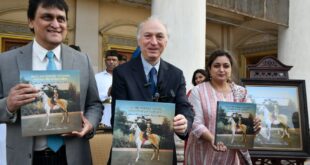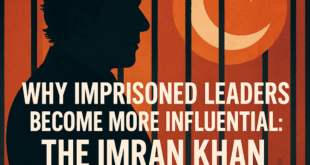By Asad Mirza
Covid-19 or Corona virus, besides giving anxiety to people all over the world has also given birth to many controversies, as to its origin, spread and control, the strategies of the governments tackling it, the role of the big business and its control by secret lobbies or groups.
• Conspiracy theories abound
• Even serious media gives credence to these theories
Though the media world wide has tried to debunk many conspiracy theories, yet it has also stoked the big question about its handling. One example of this is the 26 March edition of The Economist, its cover headline reads; ‘Everything’s under control’, the strap headlines further reads; ‘Big government is needed to fight the pandemic. What matters is how it shrinks back again afterwards’, more perplexing is its cover which shows a hand in the shadows holding a leash around a man’s neck, who in turn is holding a leashed dog.
The article goes on to state that Corona has transformed Western democracies. States have shut down businesses and sealed people indoors. They have promised trillions of dollars to keep the economy on life support. For believers in limited government and open markets, covid-19 poses a problem. The state must act decisively. But history suggests that after crises the state does not give up all the ground it has taken.
Today that has implications not just for the economy, but also for the surveillance of individuals. In most of the world the state has so far responded to covid-19 with a mix of coercion and economic heft. This vast increase in state power has taken place with almost no time for debate. Some will reassure themselves that it is just temporary and that it will leave almost no mark, as with Spanish flu a century ago.
However, the scale of the response makes covid-19 more like a war or the Depression. And here the record suggests that crises lead to a permanently bigger state with many more powers and responsibilities and the taxes to pay for them. The welfare state, income tax, nationalisation, all grew out of conflict and crisis.
• Big government proposed
• Big government to cater to big business
Meanwhile, The Guardian of 26 March reported former British prime minister Gordon Brown calling for a global government to tackle coronavirus. The newspaper further reported that GB has urged world leaders to create a temporary form of global government to tackle the twin medical and economic crises. ‘The more you intervene to deal with the medical emergency, the more you put economies at risk,’ said Gordon Brown.
The former Labour prime minister, who was at the centre of the international efforts to tackle the impact of the near-meltdown of the banks in 2008, said there was a need for taskforce involving world leaders, health experts and the heads of the international organisations that would have executive powers to coordinate the response.
Brown said his proposed global taskforce would fight the crisis on two fronts. There would need to be a coordinated effort to find a vaccine, and to organise production, purchasing and prevent profiteering.
• Privacy laws being infringed
• Extreme watch by governments cause of concern
However, his suggestion was worrying as it asked for increasing the power and extent of working of the World Bank and the International Monetary Fund, which according to GB needed an increase in their financial firepower to cope with the impact of the crisis on low- and middle-income countries.
But that is not the biggest problem. The Economist’s story further explained; the greater worries lie elsewhere, in the abuse of office and the threats to freedom. The most worrying is the dissemination of intrusive surveillance.
Invasive data collection and processing will spread because it offers a real edge in managing the disease. But they also require the state to have routine access to citizens’ medical and electronic records. Surveillance may well be needed to cope with covid-19. Rules with sunset clauses and scrutiny built in can help stop it at that. But the main defence against the over mighty state, in tech and the economy, will be citizens themselves. They must remember that a pandemic government is not fit for everyday life.
An example in this regard is the Arogya Setu App, introduced by the GoI, criticised by opposition leader Rahul Gandhi, who raised concerns about one’s privacy and government’s need to invade it.
Available in 12 languages, Aarogya Setu requires a user to enter personal details, including recent travel history, while downloading it. It has however, stoked political controversy as it uses the phone’s Bluetooth and GPS to monitor the user, besides it can’t be de-registered even if the app is uninstalled.
Beyond the legal loopholes, there are many technical loopholes as well. Cyber security experts worry that Aarogya Setu could violate its users’ privacy and be a surveillance tool in the hands of the government. According to some experts what the government is doing is violation of informational rights by employing it as a surveillance system.
Digital rights activists claim this violates the Supreme Court’s verdict on the right to privacy and the IT Act, which emphasises consent and proportionality. Delhi-based think tank, The Dialogue, in its report released early May says that to increase transparency, the app must be an open source app, and that data auditing must be allowed to settle concerns regarding lack of checks and balances. Secondly, the app must clearly define its purpose to ensure that the date collected cannot be misused. ‘Without a data protection law in our country, it is necessary that utmost caution be taken to adhere to privacy principles,’ says Kazim Rizvi, Founding Director of The Dialogue.
All these questions and assertions leads one to wonder when the real information regarding Covid-19 will make its way into the public domain. And till then citizens across the world will have to accept infringement of their privacy laws and government’s unnecessary and sometimes illogical steps taken to cater to the big business in the garb of alleviating people’s problems.
–About the author:
Asad Mirza is a Sr journalist based in New Delhi. In his career spanning more than 20 years, he was associated with BBC Urdu Service and Khaleej Times of Dubai. He writes on Muslims, educational, international affairs and interfaith issues. Email: asad.mirza.nd@gmail.com
 Gawah (The Witness) – Hyderabad India Fearless By Birth, Pristine by Choice – First National Urdu Weekly From South India – Latest News, Breaking News, Special Stories, Interviews, Islamic, World, India, National News
Gawah (The Witness) – Hyderabad India Fearless By Birth, Pristine by Choice – First National Urdu Weekly From South India – Latest News, Breaking News, Special Stories, Interviews, Islamic, World, India, National News





